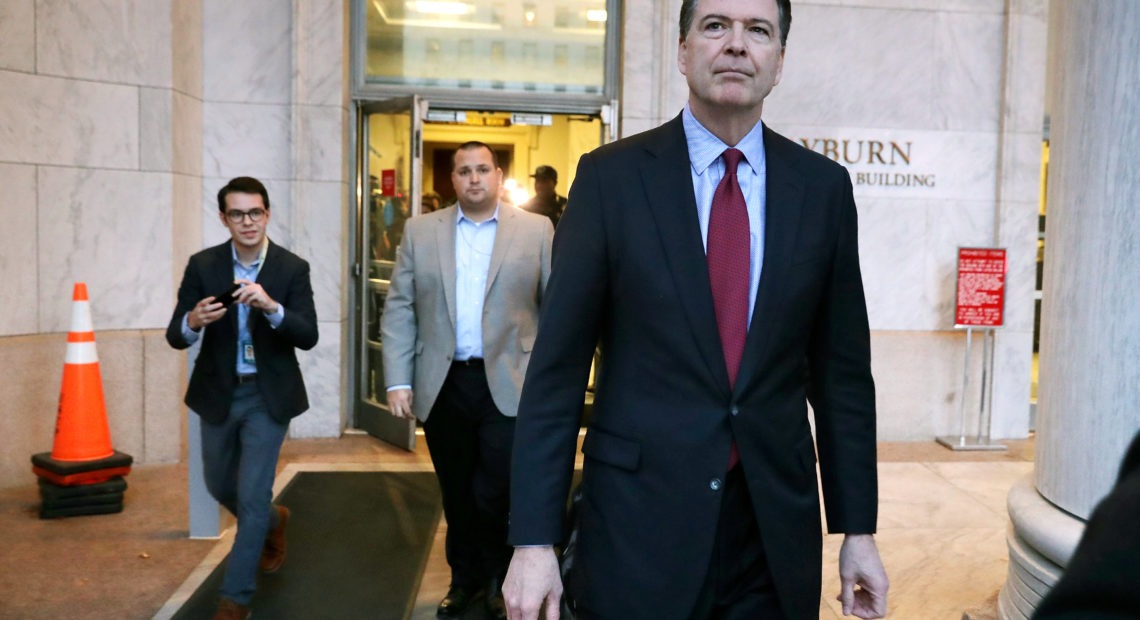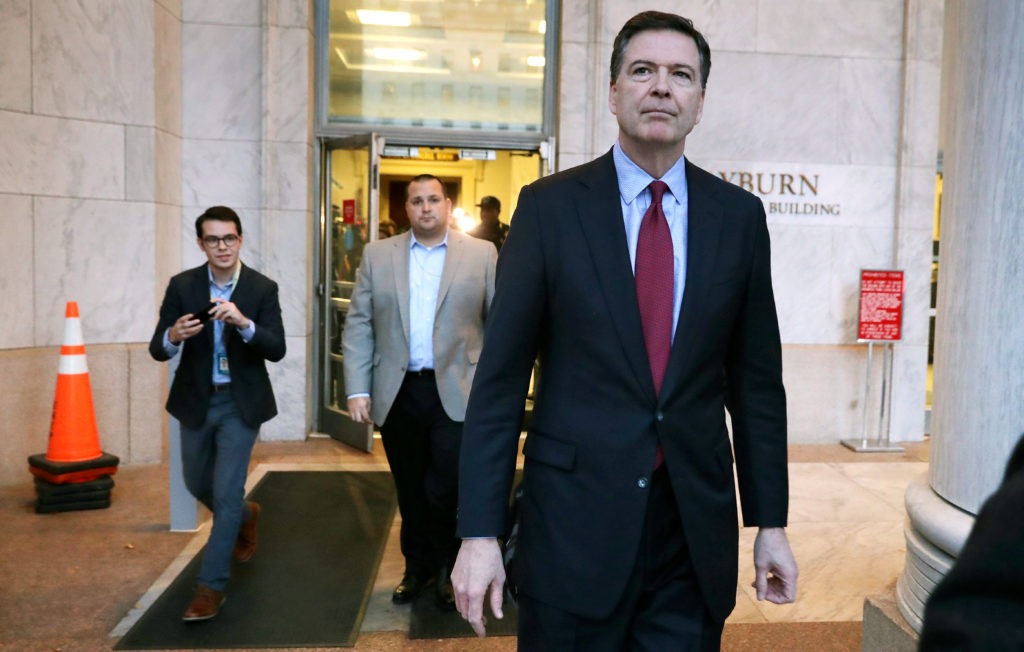
DOJ: Comey Violated Policy On His Trump Memos — But Won’t Be Prosecuted
BY PHILIP EWING
Former FBI Director James Comey violated official policy in the way he handled his memos describing his exchanges with President Trump, an investigation concluded — but Comey won’t be charged.
Justice Department Inspector General Michael Horowitz conducted the investigation into Comey’s actions and then referred his results to prosecutors.
“After reviewing the matter, the DOJ declined prosecution,” the IG’s office said in a statement on Thursday.

Former FBI Director James Comey leaves the Rayburn House Office Building after testifying to the House judiciary and oversight committees on Capitol Hill on Dec. 7, 2018.
CREDIT: Chip Somodevilla/Getty Images
Investigators concluded that Comey broke several rules.
One involved the former director’s decision to arrange for a friend to disclose the contents of a memo to a reporter with The New York Times. Another involved Comey’s decision to keep memos at home and discuss them with his lawyers but not reveal their contents or what he was doing to the FBI.
FBI officials have since assessed that some of the material in Comey’s memos deserved to be classified as “confidential,” the lowest level of classification. But investigators didn’t establish that Comey revealed any secret information to the press.
The former FBI director responded on Twitter on Thursday morning by quoting a section of the IG report and pointing out what he called all the untruthful things said about him and other matters by Trump and the president’s supporters.
Witness
Comey, by his account, began recording details about his conversations with Trump as soon as they met for a national security briefing in New York City.
DOJ IG “found no evidence that Comey or his attorneys released any of the classified information contained in any of the memos to members of the media.” I don’t need a public apology from those who defamed me, but a quick message with a “sorry we lied about you” would be nice.
— James Comey (@Comey) August 29, 2019
Comey — then FBI director — briefed the then-president-elect on the existence of the infamous, unverified Russia dossier, and Trump’s conduct in that meeting prompted Comey to begin typing up an account of it in his FBI vehicle immediately after.
Comey also wrote about exchanges in which he said Trump invited him for a solo meeting at the White House and asked for his “loyalty,” in a conversation in which Comey said he agreed always to give Trump his “honesty.”
In another meeting, Comey described a meeting in the Oval Office in which he said the president asked him to stay behind after a larger conference. With just the two of them present, Comey wrote, Trump asked him whether he could “let go” of the investigation into former national security adviser Mike Flynn.
Flynn had stepped down over conflicting statements to White House officials and the public about his conversations with Russia’s ambassador during the presidential transition.
Flynn has since pleaded guilty to lying to investigators about that exchange, in which he sought — and Russia agreed — no escalation by Moscow in response to the diplomatic measures being taken by outgoing President Barack Obama in retaliation for Russia’s interference in the 2016 presidential race.
Trump later fired Comey. That move plunged Washington into a vortex of paranoia and suspicion — and the appearance of some of the details of Comey’s memos in the press contributed to an atmosphere that prompted then-Deputy Attorney General Rod Rosenstein to commission a special counsel for the investigation into Russia’s political interference.
He appointed former FBI Director Robert Mueller, whose nearly two-year investigation revealed many links between Trump’s campaign and Russians but no criminal conspiracy to throw the election.
Mueller’s investigation also uncovered what critics called criminal behavior by Trump, who sought to control or quash the inquiry.
The “showboat”
The president called Comey a “showboat” and Mueller’s inquiry a “witch hunt.”
He and supporters also have pointed out that Mueller not only ultimately was permitted to continue his work but he didn’t bring any criminal charges involving direct collusion between Trump’s campaign and the Russians.
The results of the Horowitz investigation, establishing that Comey did violate several rules of policies, are likely to reignite criticism by Trump and supporters of the FBI and the Justice Department, which they have savaged over alleged “bias.”















